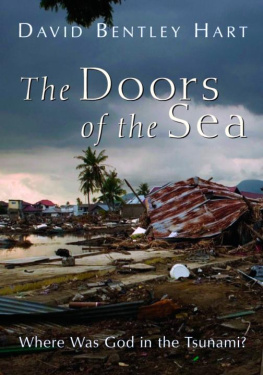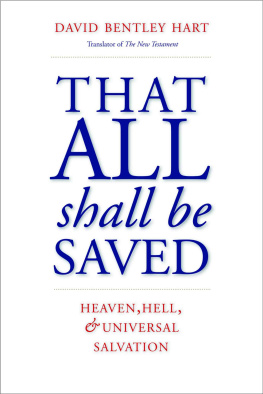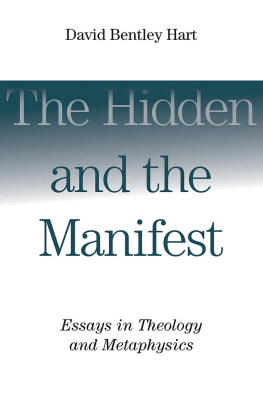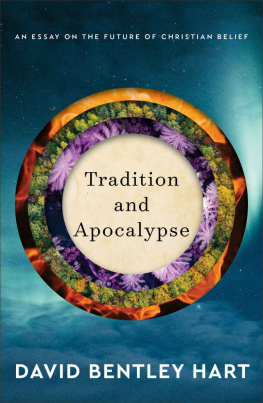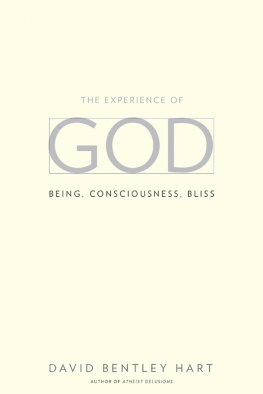David Bentley Hart - The Doors of the Sea: Where Was God in the Tsunami?
Here you can read online David Bentley Hart - The Doors of the Sea: Where Was God in the Tsunami? full text of the book (entire story) in english for free. Download pdf and epub, get meaning, cover and reviews about this ebook. year: 2011, publisher: Eerdmans, genre: Religion. Description of the work, (preface) as well as reviews are available. Best literature library LitArk.com created for fans of good reading and offers a wide selection of genres:
Romance novel
Science fiction
Adventure
Detective
Science
History
Home and family
Prose
Art
Politics
Computer
Non-fiction
Religion
Business
Children
Humor
Choose a favorite category and find really read worthwhile books. Enjoy immersion in the world of imagination, feel the emotions of the characters or learn something new for yourself, make an fascinating discovery.
- Book:The Doors of the Sea: Where Was God in the Tsunami?
- Author:
- Publisher:Eerdmans
- Genre:
- Year:2011
- Rating:4 / 5
- Favourites:Add to favourites
- Your mark:
- 80
- 1
- 2
- 3
- 4
- 5
The Doors of the Sea: Where Was God in the Tsunami?: summary, description and annotation
We offer to read an annotation, description, summary or preface (depends on what the author of the book "The Doors of the Sea: Where Was God in the Tsunami?" wrote himself). If you haven't found the necessary information about the book — write in the comments, we will try to find it.
David Bentley Hart: author's other books
Who wrote The Doors of the Sea: Where Was God in the Tsunami?? Find out the surname, the name of the author of the book and a list of all author's works by series.
The Doors of the Sea: Where Was God in the Tsunami? — read online for free the complete book (whole text) full work
Below is the text of the book, divided by pages. System saving the place of the last page read, allows you to conveniently read the book "The Doors of the Sea: Where Was God in the Tsunami?" online for free, without having to search again every time where you left off. Put a bookmark, and you can go to the page where you finished reading at any time.
Font size:
Interval:
Bookmark:

... who shut up the sea with doors, when it brake forth, as if it had issued out of the womb? When I made the cloud the garment thereof, and thick darkness a swaddling-band for it, and brake up for it my decreed place, and set bars and doors, and said, Hitherto shalt thou come, but no further: and here shall thy proud waves be stayed?
JOB 38:8-11
And I heard a great voice out of heaven saying, Behold, the tabernacle of God is with men, and he will dwell with them, and they shall be his people, and God himself shall be with them, and be their God. And God shall wipe away all tears from their eyes: and there shall be no more death, neither sorrow, nor crying neither shall there be any more pain: for the former things are passed away. And he that sat upon the throne said, Behold, I make all things new.
REVELATION 21:3-5
Where Was God in the Tsunami?

David Bentley Hart
William B.Eerdmans Publishing Company
Grand Rapids, Michigan / Cambridge, UK

This book springs from a brief column that appeared in the "Houses of Worship" section of The Wall Street Journal on Friday, December 31, 2004, under the title "Tremors of Doubt After it appeared, I was asked to write a longer opinion column, expanding the argument, for the March 2005 issue of First Things; that column appeared under the title "Tsunami and Theodicy."
I wish to thank Bill Eerdmans for suggesting that I write this book, and for making such an effort to bring it expeditiously to press. He recognized before I did that the reaction elicited by my original column required a somewhat more deliberate and reflective set of responses than would have been possible by means of discrete exchanges of e-mails. I should thank also my various interlocutors in the weeks following the column, all of whom forced me to articulate my views in greater detail (if not necessarily with conspicuously greater clarity) than I initially had. I cannot name them all, and some might not wish me to name them in any event, as the conversations in which we were involved - at a time when the horror of the catastrophe was still weighing upon many persons' minds - were sometimes characterized more by heat than by light. I must, though, express special gratitude to Anthony Esolen for the eloquence and passion of his many remarks, and for the effort of thought they provoked in me. I thank John Betz for his advice and support, and for his friendship; encouragement from a scholar and philosophical theologian of such gifts must naturally confirm me in my purpose.
This book is dedicated to Robert Wilken, with great esteem, and in gratitude for his supererogatory support for my work over the years, for his innumerable efforts on my behalf, and for having been the first to express approbation for the theological sentiments expressed in the column from which this book sprang. I would not presume to suggest that he will approve of everything I have said here, but I hope he may. To my wife Solwyn, my love and gratitude for her patience. And to my son Patrick, without whose assistance (as P.G.Wodehouse said somewhere of his daughter) this book would have been completed in half the time, all love and all joy.

I
In that great verdant arc of lands that forms the northeastern rim of the Indian Ocean and that takes the Bay of Bengal into its embrace - sweeping out from Sri Lanka and up the coasts of eastern India to Bangladesh and Burma, then down the Malay Peninsula to Thailand and Malaysia, and then further down the coast of Sumatra to the western tip of Java - there are Gods without number. Hinduism, in the full profusion of its various forms, is of course the dominant religion only of India, the Tamils of Sri Lanka, and the greater Indian diaspora of Southeast Asia. At one time or another, however, the Vedic deities have held sway over all these shores; among the Hinayana Buddhist peoples of the region - the Sinhalese of Sri Lanka and most of the native inhabitants of Thailand and Burma (or Myanmar, if one prefers) - they have always enjoyed a high, if subordinate, eminence in the order of religious devotions. The Chinese communities of the Malay Peninsula and Indonesia, being Mahayana Buddhist for the most part, but also Taoist and Confucian, are attended by bodhisattvas and divinities of a more remote provenance. Islam is the official faith of Bangladesh and Malaysia, and the dominant religion of Indonesia. Christianity, Catholic and Protestant, has a presence in all these lands, in some cases small but substantial, in others somewhat more fugitive and beleaguered. As for the aboriginal animisms of the indigenous peoples, such as the Nat worship of Burma, none of the great faiths of the far or near East has succeeded in extinguishing them. And - needless to say, perhaps - in very many places the demarcations between differing traditions are lost in a golden haze of generous and unreflective syncretism. Very few of those who live at the upper periphery of the Indian Ocean doubt that, among the many supernal powers keeping watch over those waters - benign or capricious, transcendent or local, omnipotent or merely mighty - there is at least one who is able to govern their tides and turbulences and to keep the sea within its appointed bounds.
Far below the water's surface, however, at and beneath the ocean floor, lies a source of elemental violence so vast, convulsive, unpredictable, perennial, and destructive that one might almost be tempted to think that it is itself a particularly indomitable and infernal sort of god. And, in fact, the most enduring manifestations of its power above sea level - those grim volcanic islands that lie in a long catenate archipelago off the western shores of Indonesia - have in their time no doubt been objects of worship, supplication, propitiation, and pious dread. These islands are situated along perhaps the most volatile geodynamic fissure in the world, the place where apparently two enormous tectonic plates - the IndoAustralian and the Eurasian (upon whose edge Sumatra and Java are precariously poised) - continuously pass one another by in their slow, interminable, millennial migrations. It is an immense seam of unquenchable fire that down through the geological epochs has shaped and reshaped this entire crescent of islands and continental littorals. Its forces do not subside, and it is never truly dormant; but it does know long intervals of comparative stability, during which life above goes on largely undisturbed. Up there, when the weather is calm, the water is a smooth, immeasurable, tremulous mirror of the tropical sky, gleaming like silver, furling with crystalline brilliancy, its waves sapphire blue at their crests and a deep glassy green in their inner folds. Tourists - upon whom many of the countries of the region so desperately depend - come by the thousands in order (for the most part) to luxuriate on ivory beaches and gaze out at the beauty of the ocean and marvel at the extravagant lushness of the South Asian flora.
Font size:
Interval:
Bookmark:
Similar books «The Doors of the Sea: Where Was God in the Tsunami?»
Look at similar books to The Doors of the Sea: Where Was God in the Tsunami?. We have selected literature similar in name and meaning in the hope of providing readers with more options to find new, interesting, not yet read works.
Discussion, reviews of the book The Doors of the Sea: Where Was God in the Tsunami? and just readers' own opinions. Leave your comments, write what you think about the work, its meaning or the main characters. Specify what exactly you liked and what you didn't like, and why you think so.

